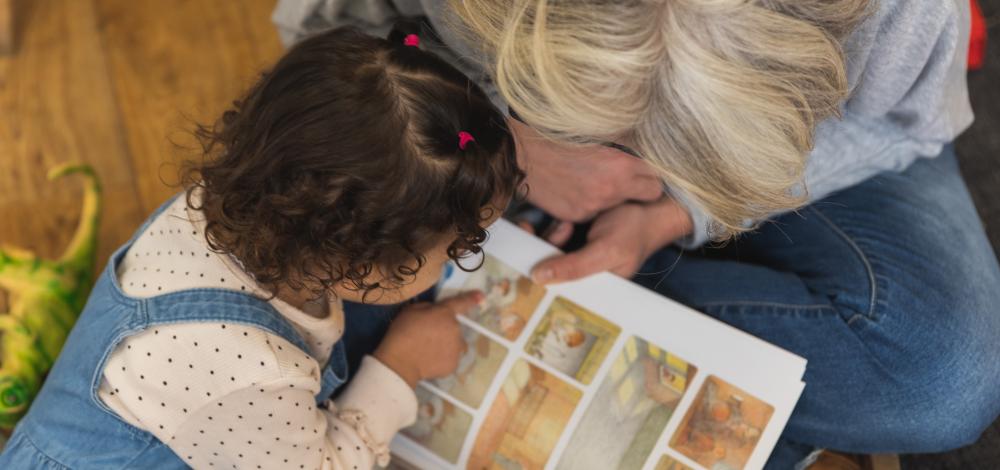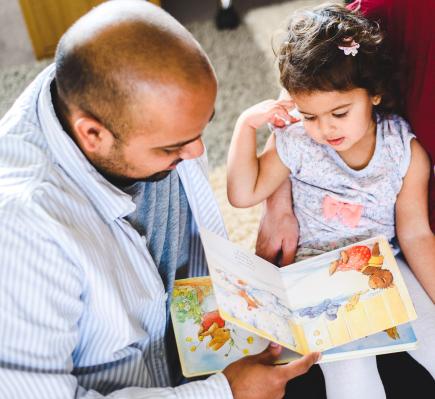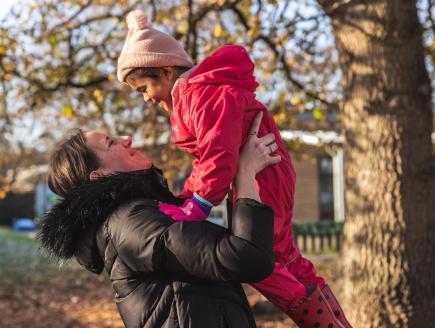learning together study
The Learning Together Study was a Randomised Controlled Trial (RCT) research study which adds to the Peep Learning Together Programme evidence base, demonstrating its benefits for children's outcomes and narrowing the gap in educational achievement. The large-scale, independent evaluation was carried out by Queen’s University Belfast and was funded by the Education Endowment Foundation. It involved 1447 families with three-year olds from 139 nursery settings, using a 20-week version of the Peep Learning Together Programme across England. The Programme aims to improve children’s outcomes by improving their parents’ skills and confidence to help their children to learn through everyday activities.
Watch the 90-second video of Peeple CEO Dr Sally Smith giving an overview of the Study and its findings:
Improving children's outcomes...
We are very pleased that overall the Study found that the Peep Learning Together Programme made a positive difference of an additional two‑months progress over a five-month period to children’s early literacy development.
... and narrowing the attainment gap:
However, the Programme made the greatest difference to children eligible for Early Years Pupil Premium, who made an additional four months' progress in core language skills and in communication, and three months' additional progress in early literacy development.
The Peep Learning Together Programme is based on evidence that the quality of learning opportunities within a child’s home environment increases their chances of doing well at school and beyond.
Outcomes for parents:
The study also found that the Programme had positive effects on parents, who reported improvements in:
- parental self-acceptance
- the home learning environment
- their confidence in enjoying and playing with their child
- their parenting knowledge and learning.
The findings of the Learning Together Study replicate those of the Birth to School Study, a six-year longitudinal evaluation of the Peep Learning Together Programme carried out by the University of Oxford. During the first three years of the evaluation, the Birth to School Study found positive effects on parent/child interactions and the quality of the care-giving environment at home. In the following three years it went on to find an increased rate of progress for the children in a suite of outcomes related to early literacy development.
Feedback from practitioners and settings
Other findings of the study showed that more than 90% of practitioners found that the Programme was easy to use and implement and also that it was delivered with high fidelity. Some practitioners felt that the length of the Programme (20 weeks) may have been a barrier for some parents. However, parents who attended at least one session of the Programme, attended on average 70% of sessions. We were pleased by this figure, given the various difficulties that can get in the way of parents attending weekly sessions with their three-year olds.
In addition, the cost to schools of delivering the Learning Together Programme is very low: £31.60 per pupil per year, as averaged over three years.
Practitioners noticed positive changes in the children’s communication, and in relationships and engagement with parents:
'I think the children are more talkative, they’re bringing things in more to school...activities to share or objects to share or books to share, and some of the children were very quiet originally and they’re much more talkative.' (Nursery practitioner)
'The confidence of parents… - as a parent but also...with each other - and their confidence at the nursery, their confidence to approach me and talk to me about absolutely anything and realise that that’s okay, and just they want to join in with things, they’ve attended things in the nursery.' (Nursery practitioner)
Practitioners found the training very useful:
'I thought the training was lovely, I really enjoyed the training, I thought it gave detail, it gave structure, it gave focus. I came away from the training feeling extremely confident about delivering the programme.' (Nursery practitioner)
Feedback from parents
Parents noticed their children's growing engagement with literacy:
'The other session that she’s really enjoyed recently was making a book, which again was something I thought she wouldn’t be interested in at all and she made two in the end…and she sat and read them to herself and she’s really proud of them.' (Parent)
'I mean the other session that he really liked was the environment… with the signs...so at the moment when we go out with the dog, he’s constantly looking for signs everywhere, like logos and things like that.' (Parent)
The study also highlighted the value of parenting programmes being available in the nursery:
'I haven’t done (apart from sort of...early days mum and baby groups, you know) toddler groups, things like that - I don’t think I would have...committed to that sort of thing if it hadn’t been available through the nursery.' (Parent)
We would like to thank the Education Endowment Foundation and Queen's University Belfast for their collaborative approach to working with Peeple on the Study. Its robust nature (as with all studies funded by the Education Endowment Foundation) gives confidence in the findings which make an important addition, both to the evidence base for the Peep Learning Together Programme, but also to the evidence, more broadly, that working with parents to improve the home learning environment is a feasible and effective means to improve child outcomes, particularly for the most disadvantaged.
We'd also like to thank the Sutton Trust and Esmee Fairbairn Foundation for the Parental Engagement Fund, which provided an important stepping stone towards this evaluation by randomised controlled trial.
Finally, we would like to thank all the settings, practitioners, parents and children who took part in the Study. We really appreciate the time and commitment involved and we hope that you will all continue to enjoy learning together!


find out more or book training
tel 01865 397 970
training@peeple.org.uk
> training courses
> in-house training
> dates & booking
> sign up to our e-newsletter

